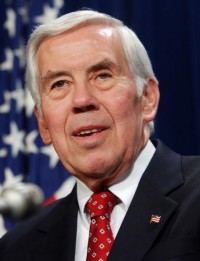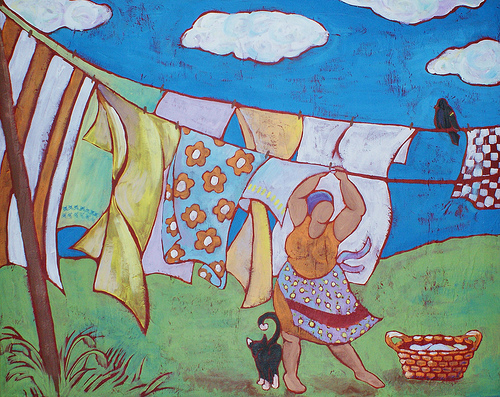This interview is part of a series on people who are making their communities smarter, greener places to live. Got a nomination? Leave it in the comments section or send it along to us.
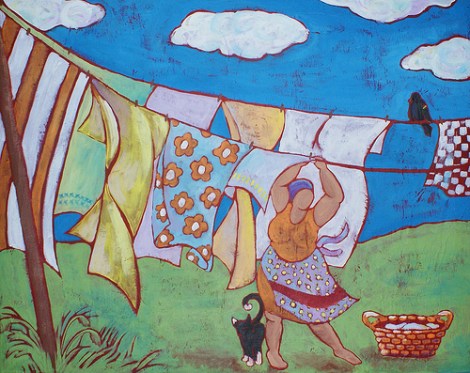
Daisey Bingham
Alexander Lee founded Project Laundry List as a Middlebury College undergrad in 1995, after hearing Dr. Helen Caldicott say we could shut down the nuclear industry if we all did things like hang out our clothes. He’s been true to the cause ever since, pushing for clotheslines across the land — even at the White House. Grist caught up with him to find out how hanging out can make for better neighborhoods, what clotheslines have to do with climate change, and why laundry stigmas are as persistent as wine stains.
Q. You created and run Project Laundry List — why, and what are its goals?
A. Growing up, my mother had always referred to herself as Mrs. Tiggy-Winkle (the prickly laundress in Beatrix Potter’s series) and the clothesline was much less a pennant of the eco-chic, as it is becoming today through our work, than a flag of New England Yankee frugality. Helen’s idea resonated with me and we started a subgroup of the environmental club. We asked people to put themselves on the line and come hang out with us, and the puns haven’t stopped.
Our mission has evolved to focus on “making air-drying and cold-water washing laundry acceptable and desirable as a simple and effective way to save energy.” This really only became my day job in 2007, after years as a teacher, law student, public utilities commission staffer, and political campaigner. I get paid roughly minimum wage, mostly raised through selling clotheslines and drying racks. I work a bazillion hours. We have never really written grants. There is no time for that nonsense when the house is burning down. This is a work of love and passion, motivated by an abiding sense that we are in planetary crisis. Not much sense in working for Lehman Brothers and laying up treasure, like many of my classmates did, when ain’t none of it gunna matter if we don’t get ahold of the climate monster. I am just not the type to drink martinis and listen to Mozart as the Titanic is sinking.
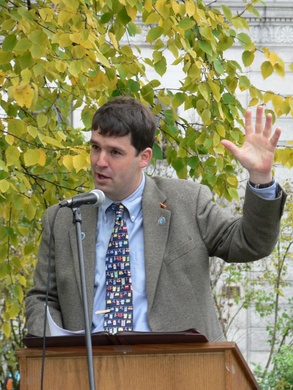 Raise your hand if you believe in the right to dry!Couresty Project Laundry ListI am inspired by people like Dorothy Day, co-founder of the Catholic Worker movement, to live and work as I do, but I fall way short. Furthermore, I am too irreverent and incorrigible to be as good a Catholic as she. An editor for my forthcoming book (More Time to Hang) likened me, somewhat admiringly, to a monk. I grunted and then chuckled, remembering Dorothy’s rebuke to somebody calling her a saint: “I won’t be dismissed so easily.” In July 2008, ABC World News, in their story on the right to dry, referred to me as “a 33 year-old bachelor lawyer from Concord, NH.” That conjures up another image, entirely. The truth lies somewhere in the middle.
Raise your hand if you believe in the right to dry!Couresty Project Laundry ListI am inspired by people like Dorothy Day, co-founder of the Catholic Worker movement, to live and work as I do, but I fall way short. Furthermore, I am too irreverent and incorrigible to be as good a Catholic as she. An editor for my forthcoming book (More Time to Hang) likened me, somewhat admiringly, to a monk. I grunted and then chuckled, remembering Dorothy’s rebuke to somebody calling her a saint: “I won’t be dismissed so easily.” In July 2008, ABC World News, in their story on the right to dry, referred to me as “a 33 year-old bachelor lawyer from Concord, NH.” That conjures up another image, entirely. The truth lies somewhere in the middle.
Q.The clothesline issue seems to have gotten a lot of press in the last year or two — to what do you attribute that? Does it surprise you?
A. No surprise. People love to talk about laundry and everybody, everybody is an expert. Laundry is a universal human experience that is tactile, olfactory, and sentimental. Nearly everybody of a certain age has their own story of twirling among the bedsheets pinned on a clothesline with a grandmother or parent. Consumers like the smell so much that Yankee Candle has four scents meant to remind us of clothes drying on the line. (Forget that they mostly smell like dryer sheets.)
We have received mention in the WSJ twice, ABC World News and the CBS Sunday Morning Show, and NPR and The New York Times (seven times!). We have a meme that works, but the clothesline is just a “gateway drug” to better environmental living. It is a jumping off point to talk about the failure of the fourth layer of government (“community” associations); to talk about clothing care issues more generally, like we are doing with the Permacouture Institute through our New Again Coalition; to talk about why taxpayers foot the bill to wash prison uniforms in hot water; and to think about so much else.
Q. I’m always taken aback when I hear about places that don’t allow clotheslines, and then I assume they’re gated communities in sprawling places. Is that generally true? And are the bans are a reflection of some sort of stigma?
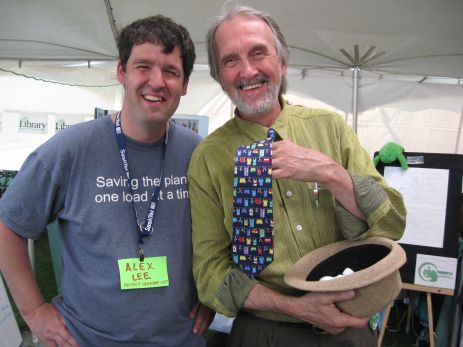 Lee (left) with Canadian folk singer and children’s TV personality Fred Penner, sporting a clothesline tie. Courtesy Project Laundry ListA. Truth is, clotheslines are banned or severely restricted by landlords and mobile home parks, too. It is not just the super-wealthy who are afraid of some mythic property value decrease if a neighbor shows some thong on the line.
Lee (left) with Canadian folk singer and children’s TV personality Fred Penner, sporting a clothesline tie. Courtesy Project Laundry ListA. Truth is, clotheslines are banned or severely restricted by landlords and mobile home parks, too. It is not just the super-wealthy who are afraid of some mythic property value decrease if a neighbor shows some thong on the line.
The Italians — only 3 to 4 percent of them own a dryer — think we are crazy. They are a fashion-conscious, industrialized nation. We could take a page from their book. By contrast, about 80 percent of American households own a dryer, but good news: for the first time last year, we did see a drastic decrease in the number of Americans who see the dryer as essential.
There are five major objections to the clothesline that I confront all of the time: Prudery, snobbery, liability/safety, convenience, and feminism. I could write a book (I am writing a book) full of anecdotes that paint a picture of an America looking for any reason not to use a clothesline. The excuses range from the absurd to the comical. In both Connecticut and New Hampshire, shills for the local chapters of the Community Association Institute testified against Right to Dry legislation, claiming that the clothesline is a liability. Somebody might walk into one in the common area of a condominium and sue the association, they claimed. Never mind that, according to the National Fire Prevention Association, dryers cause 15,000 fires every year, resulting in 10-15 deaths and $200 million in property damage.
Michelle Obama put in that garden at the White House and I said, on Facebook, “Maybe a clothesline will be next.” Within minutes someone asked me if I was being racist or snarky. He was surprised to learn we had been pushing for a White House clothesline since 2007 on www.right2dry.org. That is what we are up against here. Stigma.
In response to the Times debate I wrote a piece for, a woman proclaimed, “You’ll pry my clothes dryer out of my cold dead hands.” Project Laundry List is not telling her she cannot have a dryer. Feminism is about choices. We are telling her that if she has a dryer, the oceans may rise and her front porch will get wet. Tough choices for some.
We are not anti-dryer; we are pro-clothesline. If you cannot get up out of your wheelchair or you have debilitating allergies for part of the year, the dryer makes sense and is a marvelous invention, but the real problem is not the millions of Americans disallowed from hanging clothes, it is the hundreds of millions of Americans who refuse to get up, go outside for some fresh air and sunshine, talk over the fence with their neighbors, and mindfully take time to do an essential human task. By my estimate five billion plus people in the world manage fine without a dryer. It may not be “easy living,” but it beats having the ocean lapping at your door.
Q. What promise do better laundry habits hold for individuals? What about for climate?
A. Life is about choices. We should sweat the small stuff, because small is beautiful; however, we can ill afford not to sweat the big stuff. A report that just came out concluded that if Americans would hang their laundry out to dry, along with 16 other small steps, they could slash U.S. carbon dioxide emissions by 7.4 per cent by 2019. This is a studiously conservative study. We can do more, faster. I know we can, in my unscientific gut.
As far as laundry itself, we do a terrible job of measuring its true national energy impact. It is okay to look at the average household energy used by a fridge, but when you have over 2 million households doing fifteen loads or more per week and others skewing the average by doing laundry down the hall or at a Laundromat, the 5.9 percent figure, which is the average American residential electric use for the tumble dryer, tells you almost nothing. There are 2 million people in jail in this country and millions spent last night in a hotel, hospital, or nursing home. We do not submeter commercial or industrial laundry facilities to see how much they are using. All that laundry done for restaurants, universities, fish piers, etc., goes unaccounted for.
Q. You spent the summer on a “Clotheslines Across America” tour — what are the most memorable things you saw and heard?
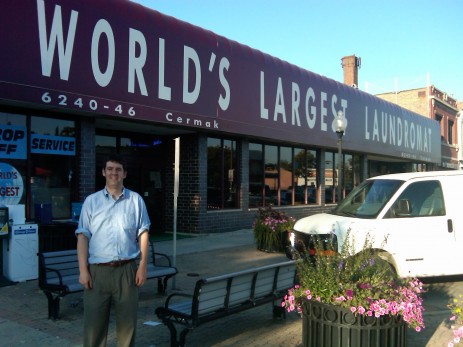 World’s largest — and solar-powered to boot!Courtesy Alex LeeA. The tour started on my 35th birthday in New York City. The purpose was to have fun and meet some of our supporters. I wanted to see this country, see the holy ground that people like my uncle, a Marine lieutenant in Korea, died to protect. I met somebody at the giant clothespin sculpture in Philadelphia who had supported us for over a decade!
World’s largest — and solar-powered to boot!Courtesy Alex LeeA. The tour started on my 35th birthday in New York City. The purpose was to have fun and meet some of our supporters. I wanted to see this country, see the holy ground that people like my uncle, a Marine lieutenant in Korea, died to protect. I met somebody at the giant clothespin sculpture in Philadelphia who had supported us for over a decade!
Another primary purpose was to provide material for a movie that is being made called Drying for Freedom — watch the trailer. The interviews that we did in Kentucky, visiting the World’s Largest Laundromat (solar hot water!) just outside Chicago, standing beneath the Arch in St. Louis on the Saturday morning of Parkapalooza, and watching a baseball game with Gov Pat Quinn of Illinois (we want a major league team to do a “Line Dry” event next year) were a couple of the highlights. I had the most fun doing a photo shoot with a pin-up girl in Philly so that we can make a poster that asks, “Why Don’t More Men Hang Out the Laundry?!” She was watching as I did the dirty work… and don’t worry, it was tasteful! Maybe every Hollywood couple can do a similar photo shoot with Celeste Giuliano (the awesome photographer) and we can produce a whole calendar on this theme.
Q. What will it take to get every U.S. municipality to give its citizens the “right to dry”?
A. What will it take to get every utility company in the country to give away clotheslines to its customers, like Toronto Hydro and BC Hydro have done in Canada? Couldn’t they give away racks, too? What will it take to get these places you are asking about to allow xeriscaping, compost piles, window AC units and screen windows (so people don’t get central air), and gardens? Maybe some really good designer drugs from Aldous Huxley. Maybe the Community Association Institute making this an organizational priority.
Q. What eco-worry keeps you up at night?
A. Environmentalists have this fascination with carbon dioxide. It is time for them to start paying attention to methane, before the proverbial cow pie hits the electric fan. To understand why methane is 72 times worse than carbon dioxide over a twenty year period, read Wikipedia. Particularly, I am worried that New England governors are about to encourage Hydro-Quebec to build more dams when nobody can show me any peer-reviewed evidence that rotting vegetation in temperate hydroelectric reservoirs are not a major producer of greenhouse gases. I have been working with the Cree since the early 1990s on this and have paddled the Rupert River — just dammed this year — five times.
Q. Anything else you want people to know about your work?
A. Without throwing about academic terms like Jevons Paradox and the Khazzoom-Brookes Postulate, I just want to say that heroes of mine, like Amory Lovins, who have asked us to invest with religious fervor in the concept of energy efficiency, have forgotten that we need to focus on what happens with all that leftover cash saved through efficiency. If the individual takes that cash and flies to a conference in Copenhagen or buys one of these new drying cabinets that Maytag thinks we need to have next to our dryer, then we have not gained a thing. In fact, it is a setback.
Read More Work for Mother by Ruth Schwartz Cowan and Elizabeth Shove’s book Comfort, Cleanliness and Convenience (Berg 2003). Stop putting your faith in sweeping political reforms, like the “clean” nuclear and America is the Saudi Arabia of clean coal mumbo jumbo coming out of our Congress, and start taking some personal responsibility. Congressman Brian Baird is on the right track with his behavior change research bill. New technology is important, but not the silver bullet.
The biggest crisis facing humanity is not campaign finance reform, climate change, nuclear waste and proliferation, or endocrine disruption and our poisoned food, air, or water, but rather how we do our laundry. What if every one of the five billion people without access to a dryer now suddenly had not only a dryer, but a refrigerator, washing machine, and hot water heater in their mud hut? And what’s up with all the wooden clothespins we buy now being “Made in China”? I was made in America and think conservation may be a sign of personal virtue, that you should put on your sweater and turn down the thermostat. It is almost winter, for Pete’s sake.
